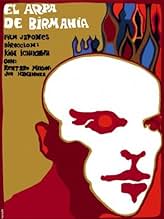Nei giorni di chiusura della Guerra, quando un soldato giapponese guidato dalla coscienza non riesce a far arrendere i suoi connazionali a una forza travolgente, adotta lo stile di vita di u... Leggi tuttoNei giorni di chiusura della Guerra, quando un soldato giapponese guidato dalla coscienza non riesce a far arrendere i suoi connazionali a una forza travolgente, adotta lo stile di vita di un monaco buddista.Nei giorni di chiusura della Guerra, quando un soldato giapponese guidato dalla coscienza non riesce a far arrendere i suoi connazionali a una forza travolgente, adotta lo stile di vita di un monaco buddista.
- Candidato a 1 Oscar
- 4 vittorie e 3 candidature totali
- Kobayashi
- (as Takeo Naito)
- Baba
- (as Akira Nishimura)
Recensioni in evidenza
What's really sad is that you can't get the movie on DVD!
In July, 1945, a Japanese platoon in Burma gets captured by the British army. One of the men - named Mizushima - has to go to the mountains to convince another Japanese platoon to surrender. But the latter platoon refuses to do so and all the members get killed in a shootout. As Mizushima walks back to his platoon, he comes across the bodies of more soldiers who perished in the war. Thus he sees his new mission in life: no longer can he be a soldier, but becomes a Buddhist monk, with the aim of healing all affected by the war.
I see Mizushima as representing what Japan as a society had to do following its defeat in WWII. Aside from the fact that the Land of the Rising Sun has had to be a pacifist country (the US forced it to have a constitution prohibiting military intervention), the bombing of Hiroshima made the Japanese people averse to militarism in general. Certainly this movie's anti-war stance makes it all the more relevant in this day and age. I recommend it.
What redeems the film and gives it its force is director Kon Ichikawa's imagery and use of music. Aided by his cinematographer Minoru Yokoyama, Ichikawa has many shots that are arresting and that linger in the mind. The most visceral, of course, are the killing fields through which the soldier turned monk Mizushima must pass in order to attain inner peace but for me the most affecting is the shot, from behind, of Mizushima, twin parrots perched on each shoulder, playing "No Place Like Home" on the eponymous musical instrument, child acolyte by his side and Japanese prisoners, behind barbed wire, listening, one hopes attentively and not just sentimentally, to the plaintive song. Which brings me to Ichikawa's use of music, mentioned by several previous reviewers. It is brilliant in its ability to convey the themes of humanity and brotherhood that are at the heart of this eminently good hearted work. In fact, the score is so striking that at times it reminds me of a John Ford film. And where I come from that is high praise, indeed. B plus.
Lo sapevi?
- QuizViewers familiar with Godzilla (1954), may recognize many of the cues present in The Burmese Harp's soundtrack, as composer Akira Ifukube adapted Godzilla's requiem theme into several pieces heard throughout the film.
- BlooperThe modern harp (with its pedal changes and its consequent ability to make changes of harmony, in particular)that is played throughout on the film's soundtrack does not match the much more basic instrument shown in the film.
- Citazioni
Captain Inouye: [Excerpt from Mizushima's letter, which Captain Inouye reads to his men as they sail back to Japan] As I climbed mountains and crossed streams, burying the bodies left in the grasses and streams, my heart was wracked with questions. Why must the world suffer such misery? Why must there be such inexplicable pain? As the days passed, I came to understand. I realized that, in the end, the answers were not for human beings to know, that our work is simply to ease the great suffering of the world. To have the courage to face suffering, senselessness and irrationality without fear, to find the strength to create peace by one's own example. I will undergo whatever training is necessary for this to become my unshakable conviction.
- ConnessioniFeatured in Ai no onimotsu (1955)
- Colonne sonoreHanyuu no Yado
(Japanese Version of 'Home Sweet Home')
I più visti
- How long is The Burmese Harp?Powered by Alexa
Dettagli
Botteghino
- Lordo Stati Uniti e Canada
- 20.015 USD
- Fine settimana di apertura Stati Uniti e Canada
- 4569 USD
- 20 ott 2024
- Lordo in tutto il mondo
- 33.763 USD
- Tempo di esecuzione1 ora 56 minuti
- Colore
- Mix di suoni
- Proporzioni
- 1.37 : 1
Contribuisci a questa pagina




























